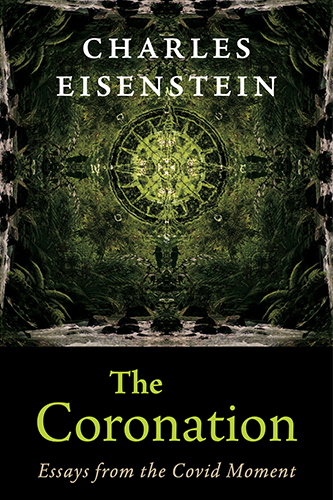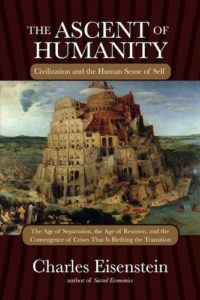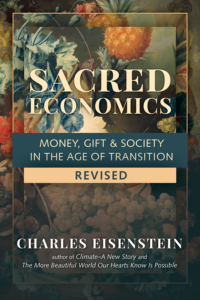The More Beautiful World Our Hearts Know Is Possible
Chapters
Chapter 35: Destiny
There are no facts. There are only stories.
—Whiteman (Nigerian shaman, quoted by Adebayo Akomolafe)
I speak of the more beautiful world our hearts tell us is possible, because our minds, steeped in the logic of Separation, so often tell us it is not. Even as we begin to accept a new logic of interbeing, still the old doubt lingers on. That is because intellectual beliefs are just an outcropping of a whole state of being. This book has explored various facets of that state of being: the habits associated with it, the wounds bound up in it, the stories that reinforce it, and the social institutions that reflect and sustain those stories. Change on all these levels is necessary in order for any one of us, and therefore all of us, to inhabit a more beautiful world.
Because this world is not possible from within the Story of Separation, it will take a miracle (by the definition of the chapter “Miracle”) to get there; in other words, we can get there only through the methods, actions, and causal principles of a new story, a new understanding of self, life, and world. By the same token, the despair that says, “We can’t make it” illuminates the deficiency of the methods, actions, and causal principles we equate with the practical and possible.
The question “Will we make it?” itself encodes a profound disempowerment. The question implies that there is a fact of the matter independent of one’s own agency. The fear behind the question is “Whatever I do, it won’t matter, because the world is doomed anyway,” and the assumption behind the fear is that I am separate from the universe. That is part of our story. The assumption, the fear, and the question go away as we transition to the Story of Interbeing. In it, we know that any change in ourselves will coincide with a change in other people in the world, because our consciousness is not separate from theirs.
To deny “What I do doesn’t much matter” is so audacious as to seem delusionary. It says: Whether we make it or not is up to me, personally. I do not mean that in the egoic sense of “It is up to me, and not to you.” I mean that it is up to me, and it is up to you, and you, and you … to everybody. It is utterly different—opposite in fact—from the disempowering truism of separation that says we won’t make it unless everyone changes and that therefore what you or I do hardly matters. What I am saying is that it is indeed all up to you, regardless of what I do, and it is all up to me regardless of what you do. The mind of Separation quails at that paradox, but the mind of interbeing understands that in the world in which you have done what it is up to you to do, I will also have done what it is up to me to do. By your actions, you choose which story and which world you are part of.
Far be it from me to attempt an intersubjective metaphysics. Let’s just say that the paradox is only a paradox in the context of separate beings in an objective universe. True, that is also the context for the Scientific Method as well as for most scientific paradigms and currently accepted technologies. Since the latter determine what we perceive as possible, when we accept that worldview the answer to “Will we make it?” is bound to be negative. There are just no realistic solutions to too many of our problems. The time for conventionally accepted solutions probably came and went in the 1960s.
I’ll share with you a bit of intuition I had recently, a picture that arose of whole cloth instantaneously in my mind when someone asked me why I don’t think we will repeat the disappointment of the ’60s. “Yes,” I said, “that was indeed our first chance, and we missed it.” We could have made a very smooth transition then, with a world population of only three billion and the majority of the rainforests still intact, the coral reefs still vibrant, CO2 levels still remediable, and so on. Forward-looking scientists got it about ecology, and visionaries of all sorts were developing all the simple technologies necessary for three billion people to live in harmony with Earth. But it was not to be.
Now we have a second chance, and this time the transition cannot be so smooth. Too much wealth has been destroyed, too many people traumatized, for there to be any hope of an easy transition. In fact, those who understand most deeply the severity of the multiple crises converging upon us hold out little cause for hope at all. Many speak of “hospicing a dying civilization.” This book argues that their despair arises from the same source as the crises themselves, and that as we transition into a new Story of the World, things become possible that had seemed miraculous before. Even with these extraordinary social and material technologies, the transition will be bumpy, but at least we can avoid the billions of casualties that some doomsayers predict.
Perhaps we will miss this chance as well. If mythology is any guide, we will still have a third chance. Maybe it will be around the year 2050. That is when the damage to the ecosphere will hit home with truly calamitous consequences, inevitable without a near-miraculous change of course right now. At that point, the cumulative damage to ecology, health, polity, and psyche will be so great that even given a hugely expanded realm of the possible, only a remnant of humanity will survive. Desertification, genetic pollution, infertility, toxic and radioactive pollution, etc., will stretch to the very limit the planet’s capacity to heal. And it is possible we will miss even that third chance. Some beings don’t make it through adolescence.
Millenarians and Utopians alike have been saying for thousands of years that their generation is living through special times. What makes me any different? What makes our time more special than any other? Could the story civilization has lived in for thousands of years continue for a few more thousand? I think not, for one basic reason: ecology. The narrative of civilization has held us as separate from ecology and exempt from its constraints on growth. I needn’t belabor the point that such growth is unsustainable; that we are reaching a coincidence of various resource peaks and ecosystem peaks that add up to Peak Civilization. If we are willing to ravage every last bit of natural wealth, we might sustain consumption growth and population growth for another forty years, but no more.
We can say, then, with confidence that we are living in special times.
* * *
I spoke on the phone yesterday with Vicki Robin, the author of Your Money or Your Life. “I am in danger of becoming a crotchety old lady,” she confessed. “People get in touch with me all the time for inspiration and support, sometimes simply wanting my presence. Just recently it was an ecovillage in Brazil. And this crotchety old woman part of me was thinking, ‘Ecovillage? We’ve tried that already. It isn’t going to work.’ And I don’t want to play that role.”
Vicki certainly isn’t alone. In my travels and correspondence I meet a lot of disillusioned old hippies. They come to my talks with such pain and weariness sometimes, not daring to rekindle the hopes of their youth for a more beautiful world. They recoil at any talk of a transformed society or a shift of consciousness, for it touches the wound of betrayal. In their communes, their love-ins, their ashrams, they caught a glimpse of an astonishingly beautiful possibility. We say they became “disillusioned,” presuming that what they saw was not real, but at the time it clearly was real, not a hallucination but a view of the future. It was just so obvious that the Age of Aquarius was dawning, and that war, crime, poverty, jealousy, money, school, prisons, racism, ecocide, and all our other shadows would soon melt away before the radiance of expanded consciousness.
What happened then was not disillusionment, which would be to discover that what they saw wasn’t real. What happened was that these harbingers of the future crumbled under the onslaught of the forces of the past, whether institutional or psychological. Not only did the powers of our society conspire to crush the hippie experiment, but the hippies themselves carried the image of those powers, an internalized oppression that had to play itself out. Even if they were aware of the need for mutual healing, their fledgling structures were too weak to hold it.
Another way to see it is that in the 1960s, the Age of Separation had not yet reached its culmination. There were still further extremes of alienation, separation, fragmentation for humanity to explore. The ’60s were like an addict’s moment of clarity on the way down. Only when the world falls apart do we hit our collective bottom and begin living the way that was shown to us.
If any of my readers are part of the hippie generation that I so love, please let me remind you of what you know: What you saw and experienced was real. It was no fantasy; it was nothing less than a glimpse of the future. Your valiant, doomed attempt to live it was not in vain, because it helped to summon and strengthen the morphogenetic field of that future possibility. Put more prosaically, it initiated a cultural learning process that a new generation is beginning to fulfill.
How do I know that what you experienced was real? Again and again, I see the embers of that experience smoldering in the eyes of even the most cynical ex-hippie. And now the moment is coming to rekindle it into flame.
Vicki and I agreed that the new generation of idealists has a tremendous advantage over the hippies. “The reason they will succeed where your generation failed is, put simply, you.” The original countercultural pioneers didn’t have elders who had preceded them into this new world. They had no one from whose mistakes they could learn, and no one to hold them in the new story when the old patterning erupted. Of course there were scattered exceptions, but in general the hippies understood that the generations preceding them were beholden to a different world. “Don’t trust anyone over thirty,” they warned.
A friend told me today, “In organizing this event we keep meeting twenty-somethings who carry a wisdom and generosity that just blows me away. They have a kind of intelligence that I couldn’t have touched when I was twenty-five.” Everywhere I go, I find the same thing: young people who were seemingly born into the understandings it took my generation decades of hard struggle to achieve. And they inhabit these understandings so much more fully. A journey that took us decades takes them months. The patterning of the old world has a very superficial hold on them. Sometimes they don’t need to go through the same process of unraveling and breakdown to leave it behind. All that is needed is an initiation, an attunement, and they shift fully into the new. We older generations hold the space for them to step into, but once there they go further than we ever could.
The generation coming of age today can actually create the world that previous generations only glimpsed. They will do that because they have shoulders to stand on. The hippie generation, and to some extent the rebel elements of the ensuing X and Y generations, will stand guard around the new creators, helping them hold the story of a more beautiful world so that it does not repeat the story of the ’60s.
The foregoing account is, admittedly, quite America-centric. As far as I am aware, what America and Western Europe were going through in the ’60s had no parallel in India, China, Latin America, or Africa. Moreover, indigenous people have always lived many of the ideals the hippies tried to reenact. However, it is Western civilization that is now taking over the world, its science, technology, medicine, agriculture, political forms, and economics pushing all alternatives to the margins. As people around the world react to that civilization and strive to build alternatives, they can still benefit from their predecessors where civilization first reached its climax.
Do not imagine, though, that it will be the West that rescues humanity from the very civilization it has perpetrated. Haplessly floundering within the invisible habits of separation, we cannot undo a civilization based on Separation. Our healing will come from the margins. Everytime I travel outside the developed world I realize this anew. When I was in Colombia, I thought, “Here are people who haven’t forgotten so much how to be human. They are spontaneous, they hug, they sing, they dance, they take their time.” On a visit to the United States, the Congolese activist Grace Namadamu agreed that my society was no less troubled than her own. True, we don’t have militias running around raping women and massacring Pygmies, but “people here don’t even know how to raise their own children,” she told me. She was flabbergasted at the lack of respect (and the obesity, the impersonality, the lack of community …).
Our healing will come from the margins. How could it be otherwise, as the center falls apart?
It will come from the people and places that were excluded from full participation in the old Story of the People, and that thus preserved some piece of the knowledge of how to live as interbeings.
It will come from the ideas and technologies that were marginalized because they contradicted dominant paradigms. These include technologies of agriculture, healing, energy, mind, ecological restoration, and toxic waste remediation.
It will also draw from marginalized or near-forgotten social and political technologies: consensus-based decision making, nonhierarchical organization, direct democracy, restorative justice, and nonviolent communication, to name a few.
It will engage the kinds of skills that our present system suppresses or fails to encourage. People who have languished outside our dominant economic institutions, working for very little doing what they love, will find their skills and experience highly valued as pioneers of a new story.
It will liberate the marginalized parts of people who have been suppressing their true gifts and passions in order to make a living or be normal. To some extent, this category probably includes every member of modern society. We can feel the stirring of these suppressed gifts any time we think, “I wasn’t put here on Earth to be doing this.”
It will embody and validate marginalized parts of life, the things we neglect in the rush and press of modernity: qualities of spontaneity, patience, slowness, sensuality, and play. Beware of any revolution that doesn’t embody these qualities: it may be no revolution at all.
Do you want a glimpse of the future? You can find it in what has been rejected, cast into the waste pile, and flourished there, in the domain of the “alternative,” the “holistic,” and the “countercultural.” (Things that were cast aside and did not flourish and develop, say foot binding or chattel slavery, are not in this category.) These will become the new normal. Some people are living there already, but most of us are still caught between two worlds, living part in the old and part in the new.






